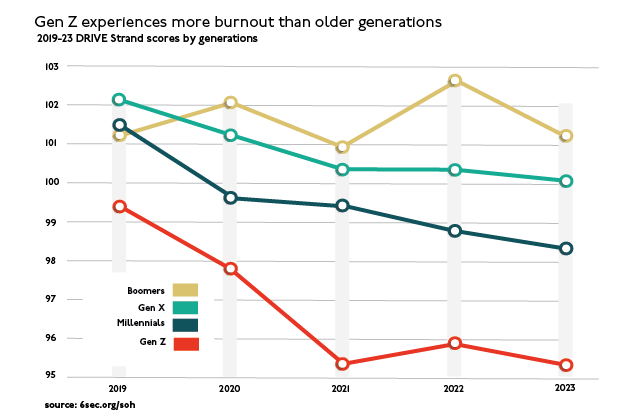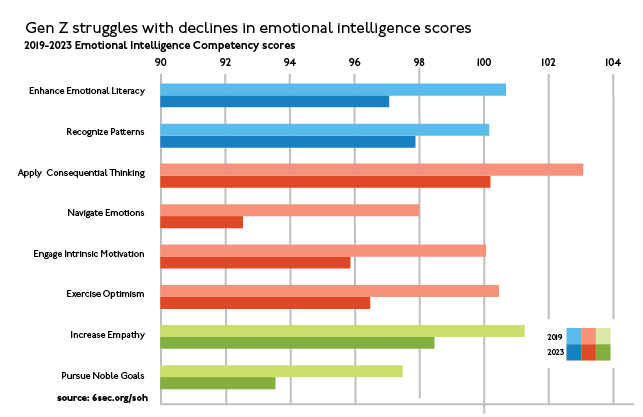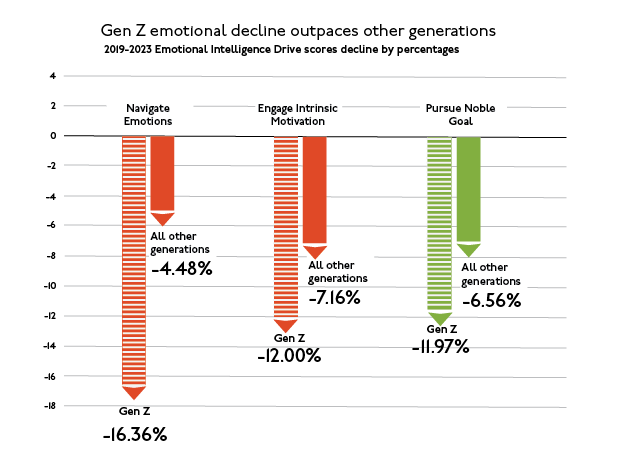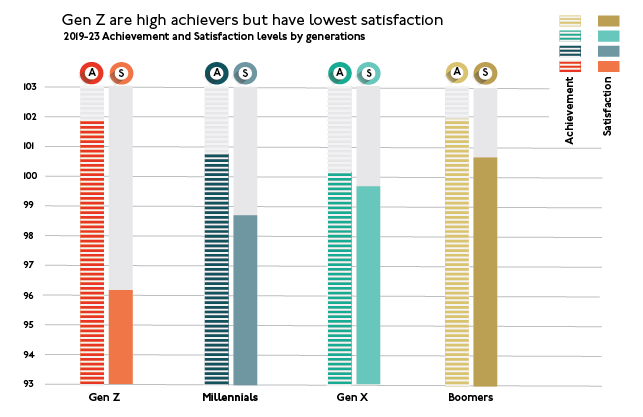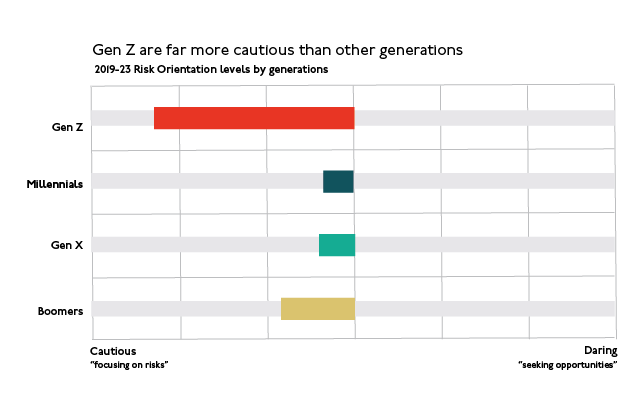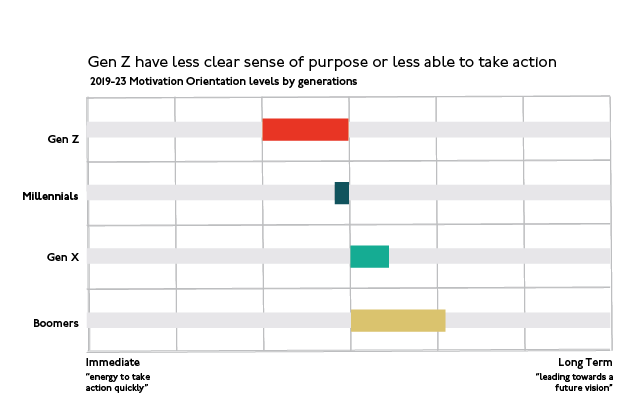Emotional Intelligence at Work
By Michael Miller

Gen Z Is Unlike Any Generation Before It. New Research Sheds Light on Why – and How to Work More Effectively with Zoomers
April 2024
This is Emotional Intelligence at Work, a newsletter about workplace culture, employee wellbeing, and how to create sustainable, thriving businesses. This is the browser version. If you want to get the monthly newsletter free in your inbox, you can subscribe here.
You may have noticed that Gen Z is catching a lot of flak lately.
In a way, it’s inevitable. Gen Z will soon surpass Millennials as the most populous generation on earth, and will overtake baby boomers in the workforce by 2024. Older generations have nearly always looked down on younger ones, arguing they are lazy, entitled, and unprepared – especially at work. Spoiler alert: that’s what people are saying about Gen Z. In a recent survey, 74% of managers and business leaders reported that they find Gen Z more difficult to work with than other generations. The respondents reported that this group tends to feel entitled and demonstrate a lack of effort, motivation and productivity.
How much of the criticism is legitimate? Is Gen Z lazy and unmotivated – or simply misunderstood? Is this just classic generational bias, or is there something unique about Gen Z’s upbringing and values that make them more difficult to work with?
The 2024 State of the Heart report, the world’s largest study of emotional intelligence and wellbeing, provides a series of fascinating insights on Gen Z – at work and beyond. What does the data reveal? It busts the myth of several popular stereotypes on Gen Z, and adds to a growing pile of troubling evidence for others.
First, let’s look at the key findings. Then we’ll explore some much needed context about Gen Z’s values, priorities and perspectives – and what that means about working effectively with Zoomers.
Register to receive the full State of the Heart report →
Research: 3 insights on Gen Z from the world’s largest study of emotional intelligence
When our research team first started analyzing the raw State of the Heart data in January, one story immediately jumped off the page: Gen Z. While the entire world is experiencing an emotional recession characterized by low wellbeing and high burnout, the problem is particularly acute for Gen Z. Here are 3 key findings from the State of the Heart report:
1. Gen Z needs an emotional stimulus
Burnout is surging among Gen Z workers. Why? Our data shows a striking generational divide in emotional intelligence, a key driver of burnout. Historically, emotional intelligence has increased slightly with age. But in recent years, that age gap has exploded. Young people are exhibiting far lower emotional intelligence and far higher rates of burnout than older generations.
Check out burnout among Gen Z compared to other generations, since 2019:
This next graph shows the 8 emotional intelligence skills measured by the Six Seconds Emotional Intelligence assessment (SEI), the report used in this study. It compares Gen Z’s 2023 scores to 2019. As you can see, they’ve declined on every competency, and some by a statistically significant margin, like the ability to Navigate Emotions:
Overall, this means that the average young person has declined in their ability to do the following:
- name and understand feelings,
- recognize recurring patterns of thought or behavior
- weigh the pros and cons of decisions
- navigate feelings
- stay motivated by meaningful values
- see new possibilities
- empathize with others, and
- feel connected to a bigger purpose
Yikes.
And on the 3 competencies that make up the DRIVE, or Burnout, strand, Gen Z’s decline is double or triple that of other generations:
All over the world, Gen Z is experiencing a mental and emotional health crisis.
2. Is Gen Z lazy? The data says no
What about the stereotype that Gen Z is lazy, entitled and unproductive at work? While this may be the case for individual members of the cohort – as is true, to be sure, with some members of any age group or demographic – the State of the Heart data debunks this myth. Gen Z are high achievers, driven by a competitive spirit and an eagerness to prove themselves. But as you can see on the graph below, over half (53.7%) of Gen Z scored low on Satisfaction, signaling high risk for disengagement and burnout. The high performance isn’t sustainable.
3. Gen Z is uniquely direct, pragmatic and ready for action
Gen Z has a strong sense of self-determination and self-agency. As we’ll explore in the next section, this is a natural result of the environment that they’ve come of age in. But in the Six Seconds Model of Emotional Intelligence, balance is key. If one competency is much stronger or weaker than the others, it can impact your ability to smoothly utilize your emotional intelligence skills in an effective way.
Gen Z shows a unique mix, especially for a younger generation:
- Gen Z is more cautious than older generations, less tolerant of risk. This seems counterintuitive given the biological imperative for younger people to be more risk oriented, and at this extreme, this is probably indicative of anxiety.
Gen Z is more focused on the short-term and practical action, lacking the idealism or sense of purpose often associated with younger generations. They prefer direct, immediate action.
Want more graphs and analysis on Gen Z’s emotional orientation?
Register to receive the full report →
iGen, Zoomers and Gen Dread: Gen Z’s nicknames provide important context on worldview
How did Gen Z end up as an anxious, high achieving, action-oriented and struggling group, as a whole?
Each generation has its own events and conditions that take place during its formative years, and shape members’ personal and professional lives. To understand Gen Z fully – and consequently how best to work with them – we must understand the circumstances in which they’ve grown up and entered the workforce. The biggest factors are the introduction of the smartphone, the COVID-19 pandemic, and the climate crisis.
iGen
One of the defining traits of Gen Z is their relationship to technology. Gen Z is the first generation to own smartphones with social media apps while their adolescent brains were still developing. Lucky them, right? Not so much! A growing body of research suggests that this is the key driver of the mental health crisis. Jonathan Haidt is an American psychologist, author and professor at the New York Stern School of Business. He’s one of the leading researchers on how technology is harming the social development and mental health of children. Here’s a short clip of his recent conversation with Professor Scott Galloway about the role of smartphones on Gen Z’s development:
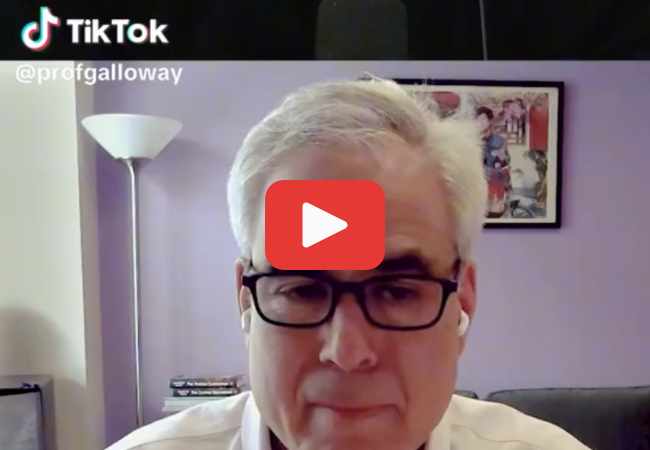
The iGeneration hs been a sort of global experiment on what happens when we introduce smartphones at such a crucial stage of development – and the data so far is alarming. The State of the Heart is some of the most damning evidence yet, at least on a global scale.
But in addition to the negative impact, smartphones have shaped Gen Z in more neutral and positive, but still powerful, ways.
“Gen Z has a strong sense of self-agency,” says Roberta Katz, a former senior research scholar at Stanford’s Center for Advanced Study in the Behavioral Sciences (CASBS). “They don’t necessarily see elders as experts, and they don’t believe in hierarchy for hierarchy’s sake,” Katz says. Having grown up in a world of search engines where information is free and shared, and results are only one click away, they seek out answers for themselves if they want to know more about something. As a result, they question everything – from their peers, parents, or people at work. They are not afraid to challenge why things are done the way they are. This may rub older generations the wrong way, but it’s the natural result of Gen Z not having to rely on elders for information as much as any generation before them.
Zoomers
Gen Z, or Zoomers, are the unlucky generation who began to enter the workforce as the world was locked down by and emerged from a global pandemic. This not only robbed them of critical opportunities to get to know coworkers and mentors in a more meaningful way, but now they are along for the ride as organizations stumble through the transition to a new model of hybrid and flexible work. As the first generation of true digital natives, clunky return-to-office mandates have hit Gen Z harder than anyone else. “This idea that you have to be in your chair at your desk to be considered working — it’s so foreign for Gen Zers,” says Jonah Stillman, who co-authored the book Gen Z @ Work: How the Next Generation is Transforming the Workplace, with his dad. “I’ve never known a world where we can’t work from anywhere. I’ve always been able to get as much done on my smartphone from 50,000 feet in the air on an airplane as I [can] sitting at my desk.”
As a result, a large majority (73%) of Gen Z employees want permanent flexible work alternatives, per research from the World Economic Forum. They want to have the freedom to choose where and when they work.
In an environment in which many organizations are issuing return-to-office mandates, without clear reasoning, it’s a recipe for burnout.
Gen Dread
This generation has been shaped by two global calamities: the climate crisis and the COVID-19 pandemic. Dr. Britt Wray, a Stanford scholar and Climate of Emotions panelist who studies climate anxiety, labels this response of young people to the existential threat of climate change and other challenges, “Gen Dread.” These existential threats have certainly contributed to Gen Z’s high rates of anxiety and depression, and has also made them more cautious, focused on threats and driven toward immediate action than the youthful generations who came before them. In the context of what they’ve been through and the challenges they face, this is an understandable reaction. Gen Z’s orientation may be atypical, but so is the nature of the problems they face.
I hope this research and analysis on the bigger forces at play can help you understand, connect with, and work with members of Gen Z better than ever.
For the full body of research on emotional wellbeing worldwide, and practical tips to work with Gen Z, register to receive the full State of the Heart report today. It will be released in the coming weeks, and we’ll send it directly to your inbox.
- The Modern Mentoring Playbook:The 3 Cs of Mentoring and What Every Leader Needs to Know About How to Lead More Effectively - May 13, 2025
- Breaking Free from Phone Addiction: A 3-Step to Emotional Intelligence Guide to Stop Scrolling and Start Connecting - March 18, 2025
- Emotional Intelligence at Work:In the Era of AI, What Happens to Human Skills? - November 19, 2024

